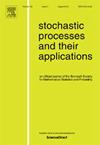Diffusive limit approximation of pure jump optimal ergodic control problems
IF 1.1
2区 数学
Q3 STATISTICS & PROBABILITY
引用次数: 0
Abstract
Motivated by the design of fast reinforcement learning algorithms, see (Croissant et al., 2024), we study the diffusive limit of a class of pure jump ergodic stochastic control problems. We show that, whenever the intensity of jumps is large enough, the approximation error is governed by the Hölder regularity of the Hessian matrix of the solution to the limit ergodic partial differential equation and is, indeed, of order for all . This extends to this context the results of Abeille et al. (2023) obtained for finite horizon problems. Using the limit as an approximation, instead of directly solving the pre-limit problem, allows for a very significant reduction in the numerical resolution cost of the control problem. Additionally, we explain how error correction terms of this approximation can be constructed under appropriate smoothness assumptions. Finally, we quantify the error induced by the use of the Markov control policy constructed from the numerical finite difference scheme associated to the limit diffusive problem, which seems to be new in the literature and of independent interest.
求助全文
约1分钟内获得全文
求助全文
来源期刊

Stochastic Processes and their Applications
数学-统计学与概率论
CiteScore
2.90
自引率
7.10%
发文量
180
审稿时长
23.6 weeks
期刊介绍:
Stochastic Processes and their Applications publishes papers on the theory and applications of stochastic processes. It is concerned with concepts and techniques, and is oriented towards a broad spectrum of mathematical, scientific and engineering interests.
Characterization, structural properties, inference and control of stochastic processes are covered. The journal is exacting and scholarly in its standards. Every effort is made to promote innovation, vitality, and communication between disciplines. All papers are refereed.
 求助内容:
求助内容: 应助结果提醒方式:
应助结果提醒方式:


